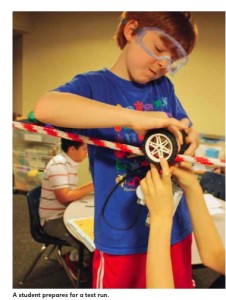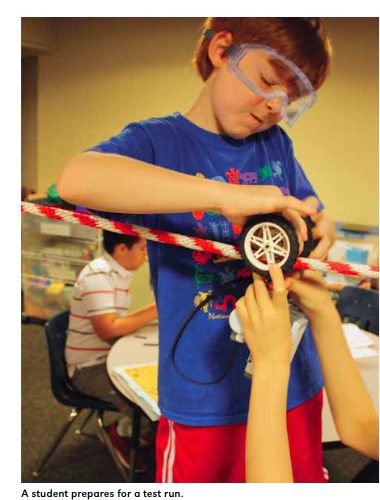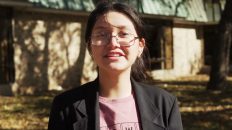

A Brief Conversation with Bill Burton, author of article, “Engineering Encounters”, and Lower School Science teacher at the Lamplighter School in Dallas, TX.
(Link to pdf of full article is below)
1. Why do you see it as important to create a classroom culture for engineering in lower school?
Humans are born to engineer. From very early on, we stack things, put things together, knock things down. As babies, it’s our way to explore the world around us. But just like any other skill, engineering needs to be practiced and honed. Engineering should happen at every grade level so our students can grow into our future innovators.
2. What surprised you most?
I was surprised at some of the high level conversations I heard students having about different potential engineering solutions. If the conversations were transcribed, you probably wouldn’t know it came from fourth grade students.
I purposefully made different levels of achievement for the students, so the challenge could meet them at their level. At one end of the spectrum was a fairly simple device. At the other end was a complex set of tasks. I honestly didn’t think any group would be able to complete the most challenging level. I was wrong. And happily so.
3. What issues remain that you would like to address next time you have your kids do a similar activity?
Every once in a while I’ll hear a girl say something like “Girls just aren’t good at building” or “Boys are better at Legos.” I feel a little sick when I hear things like that. I really wish parents and teachers and kids would build up the idea that everyone can be an engineer and just like everything else, it just takes practice and hard work to become really good at it. I try to do my part to teach that, but it’s hard to overcome thoughts like that sometimes.
4. In what other ways do you see yourself helping your students to “learn to become an innovator”?
For me, I think, the most important thing about the engineering challenges I lead is that there is not a ‘right’ answer. Or, I guess the best way to say it is that there are MANY right answers. At the end of the day, if all the projects look the same and work the same, I haven’t done my job. I also a huge fan of not knowing. Kids ask me questions all the time like “how to I make this?” or “what piece should I put here?” My standard response is “I don’t know…see if you can figure something out.”
Read Bill’s full description of his classroom activity and how the kids responded here: Burton_EnginEncounters_Sept14
About Bill:




Bill teaches science to 1st-4th graders at the Lamplighter School in Dallas, TX, where he is also the Science Curriculum Coordinator. Before that, he taught 6th grade science at the Duke School in Durham, NC. He earned his Master of Science degree in Information Science from the University of North Carolina at Chapel Hill, his Master of Education degree from Harvard Graduate School of Education, and his Bachelor of Science degree from Ferrum College in Virginia. When Bill is not teaching, he enjoys playing frisbee, gardening and writing fiction.








Add comment